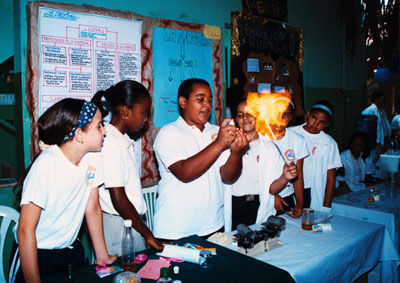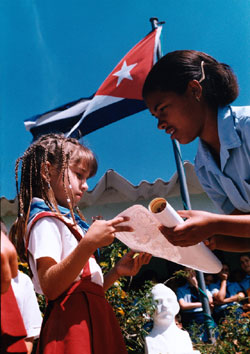
 |
UNESCO Implementing Mauritius Strategy |
 |
  | UNESCO at Mauritius '05 |  |
  | From Barbados'94 to Mauritius'05 |  |

|  |  |
 | Youth |
At the UN Pacific preparatory meeting for B+10 (Apia, 4-8 July 2003), participants “recognized the key role played by youth in promoting a sustainable development future for the region, and noted the importance of encouraging youth to contribute to the decision making process for sustainable development”.
Consistent with that sentiment and resolve, a number of ongoing and planned UNESCO activities relating to sustainable development involve young people from Small Island Developing States (SIDS).
The Third UNESCO Youth Forum was held in Paris from 26-28 September 2003, just before the 32nd session of the General Conference. Participants include some ten young persons from Small Island Developing States. Forum discussions and debates were organized around three themes: Education for sustainable development, in particular freshwater management; Youth and HIV/AIDS -- preventive education; UNESCO and young people -- ways and means of communication and cooperation.
The Associated Schools Project Network (ASPnet) promotes the ideals of UNESCO by conducting pilot projects in favour of better preparing children and young people to meet effectively the challenges of an increasingly complex and interdependent world. Launched in 1953, the network now includes over 7,500 educational institutions ranging from pre-school education to teacher training in 170 countries. In August 2003, ASPnet’s 50th anniversary was celebrated at the Navigators for Peace Congress held in Auckland, New Zealand.
The current strategy and plan of action of ASPnet places emphasis on reinforcing the four pillars of Learning for the 21st Century (learning to know, to do, to be and to live together) and promoting quality education as outlined in Dakar Framework of Action on Education for All. ASPnet has been closely involved in the multimedia teacher education programme ‘Teaching and Learning for a Sustainable Future’ and the testing of a young person’s guide to the World Heritage (jointly with the World Heritage Centre). At the regional level, flagship initiatives include the Caribbean Sea Project and Sandwatch, both aimed at encouraging the effective response of young people to their coastal and marine environment. Transatlantic Slave Trade is another network project.
 An international photo contest on young people as seen by their teachers was organized as part of activities to mark the 50th anniversary of ASPnet. Among the 'special mentions': left, Colegio Santa Rosa de Lima, Dominican Republic; and below, Instituto preuniversitario vocational de ciensas exactas Ernesto Guevara, Cuba. An international photo contest on young people as seen by their teachers was organized as part of activities to mark the 50th anniversary of ASPnet. Among the 'special mentions': left, Colegio Santa Rosa de Lima, Dominican Republic; and below, Instituto preuniversitario vocational de ciensas exactas Ernesto Guevara, Cuba. |

Among UNESCO activities related to HIV/AIDS is the e-space youth initiative on HIV/AIDS and human rights: its aim is to empower young people and their organizations to take human rights action to counter HIV/AIDS and related stigma and discrimination. An on-line kit proposes a series of ideas for youth action. The World AIDS Campaign 2002-2003 has also highlighted factors leading to stigmatization and discrimination in respect to HIV/AIDS propagation, especially among young people.
Involving young people in determining the future of their islands is an important part of Small Islands Voice (SIV). An initiative of UNESCO’s Coastal Regions and Small Islands platform, SIV started in early 2002 and currently works in three regions: Caribbean (St Kitts and Nevis, St Vincent and the Grenadines, San Andres Archipelago), Indian Ocean (Seychelles) and the Pacific (Palau, Cook Islands). Among the initial activities – the launch of an internet based discussion forum for linking young islanders across the regions, and surveys and interviews for identifying issues of special concern to youth. An evaluation of these initial activities and planning of future work was undertaken at an inter-regional workshop held in Palau in November 2002. |
|
Projects
 | Caribbean Sea Project (CSP) |
| Environmental flagship project launched in 1994 within UNESCO’s Associated Schools Project Network (ASPnet). Aim is to heighten young people's effective response to the marine environment as a pre-requisite for their positive action and to enable them to learn about the rich cultural diversity of the Caribbean region. >> More
|
 | Forum for Pacific Youth |
| Four-year youth programme (now completed). Activities included training in the use of Internet. Reports from the programme available from the UNESCO Office for the Pacific. >> More
|
Events
Websites
 | Caribbean Federation of Youth (CFY)
Advancing the interests of Caribbean youth, seeking the active involvement and participation of young people in the process of progressive social change.
>> More info >> Go to website
|
 | Caribbean Youth Environment Network (CYEN)
Promotes environment and development education and awareness-raising for youth of the wider Caribbean. Action campaigns reach people through community participation, publications, video and radio programmes.
>> More info >> Go to website
|
 | FAO: Rural Youth Development
Strengthening and expanding existing government and non-government rural youth programmes and helping in the setting-up of new ones that enable young women and young men to become productive and contributing citizens of their local communities.
>> More info >> Go to website
|
 | Global Youth Action Network (GYAN)
Links youth organizations in almost 200 countries, providing resources and recognition for positive youth action and facilitating intergenerational partnership in global decision-making.
>> More info >> Go to website
|
 | Infoyouth Programme
Focuses on the introduction of young people to new information and communication technology skills, particularly in marginalized communities and post-conflict zones.
>> More info >> Go to website
|
 | International Youth Parliament
Network of young leaders in 150 countries with a vision of youth building an equitable, sustainable and peaceful world.
>> More info >> Go to website
|
 | Pacific Youth Council (PYC)
Regional, non-government, voluntary association established in 1996 to encourage and strengthen territorial and national youth organizations and promote a regional identity for Pacific youth. Secretariat within the Pacific Youth Bureau Office at South Pacific Commission (SPC) Headquarters, Noumea, New Caledonia.
>> More info >> Go to website
|
 | Pacific Youth Environment Network (PYEN)
Formed in 1999, network of young environmentalists (16-30 years old) from the South Pacific region who are actively involved in environment, sustainable development and youth projects in their own countries and further abroad.
>> More info >> Go to website
|
 | TakingITGlobal (TIG)
Encourages young people to believe in themselves and their ability to make a difference in the world, creating environments where people are exposed to new thinking, a diversity of voices, and new opportunities.
>> More info >> Go to website
|
 | This is Our Time
Annual, global communications project for secondary schools initiated for the UNESCO Associated Schools Project Network (ASPnet).
>> More info >> Go to website
|
 | UNEP Youth Advisory Council (YAC)
Group of 12 youth leaders (two per region) elected biennially at UNEP's Global Youth Retreat, which works closely with UNEP on environmental issues, UNEP decision making processes, and UNEP programme development. Council members support UNEP in enhancing environmental awareness and act as ambassadors for the environmental conscience of young people world-wide.
>> More info >> Go to website
|
 | United Nations Youth Agenda
Empowering youth for development and peace. Web-site provides an overview of United Nations concerns and actions for young people, including a vision of what young people can contribute in society and information on youth-related activities of various UN programmes and institutions.
>> More info >> Go to website
|
 | Voices of Youth
UNICEF’s Internet project which encourages young people to express and exchange their views in discussion forums on important world issues (e.g. child protection, girls’ education, HIV/AIDS, sustainable education).
>> More info >> Go to website
|
 | World Assembly of Youth (WAY)
International coordinating body of national youth councils, with 94 member organizations from all continents. Founded in 1949, WAY has consultative status with various United Nations institutions (including UNESCO) and acts as a bridge between youth and the UN.
>> More info >> Go to website
|
 | World Youth Forum of the United Nations System
The most recent forum (the fourth in the series) was held in Dakar (Senegal) in August 2001, and had as its central purpose the empowerment of youth to participate more effectively in every aspect of society.
>> More info >> Go to website
|
 | Youth @ the World Summit on the Information Society (Geneva, December 2003: Tunis, November 2005)
Young people are the most avid consumers of technology and a driving force behind technological innovation and entrepreneurship. In this vein, youth are active participants in the Summit's process, and critical to its implementation.
>> More info >> Go to website
|
Documents
 | Youth, Sustainable Consumption Patterns and Life Styles - by
Report of UNEP-UNESCO project on consumption patterns of young people, based on a survey in 24 countries and six case studies and a closing workshop held in Paris in November 2000. Report published under the aegis of the programme on Management of Social Transformations (MOST).More |
 | Youth Sourcebook on Sustainable Development - by
Contains information on youth’s concerns with sustainable development issues, case studies of youth action together with advice on how to organize for action, useful resource lists, and a directory of international and regional youth organizations. Prepared under the aegis of the International Institute for Sustainable Development (IISD).More |
 | Youth Media Education CD-Rom - by
Reports on a seminar held in Seville in February 2002 and presents studies and articles concerning media literacy including recommendations made by a group of experts.More |
 | Small Islands Voice: Laying the Foundations - by
Assessment of initial activities carried out in 2002 within the Small Islands Voice initiative, and proposals for 2003. Based on inter-regional workshop held in Palau in November 2002.More |
 | YouthXchange - by
Training kit generated within UNEP/UNESCO project on youth and life styles, designed to raise awareness of sustainable consumption and to empower young people in adopting sustainable choices in their daily lives.More |
 | Mainstreaming the Needs of Youth - by
Includes sections on UN and UNESCO youth forums, young people in UNESCO’s programmes (world heritage, information and communication, HIV-AIDS discrimination, education for peace, women in science, sustainable development, education to fight exclusion, glimpses into selected youth projects in the field), milestones, publications.More |
 | United Nations World Youth Report 2003 - by
Includes a review of current global situation of young people (based on expert group meeting held in Helsinki in October 2002) and an evaluation of the World Youth Forum of the United Nations system (most recent forum held in Dakar in August 2001).More |
|

|
 FEATURES FEATURES |
|
|

